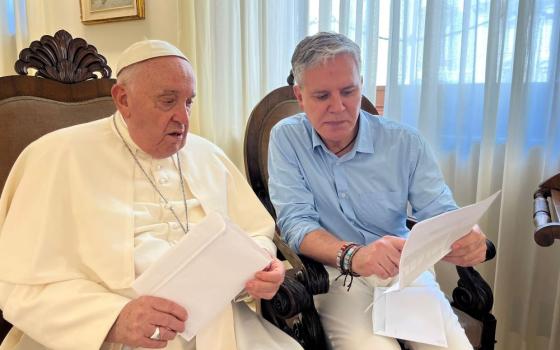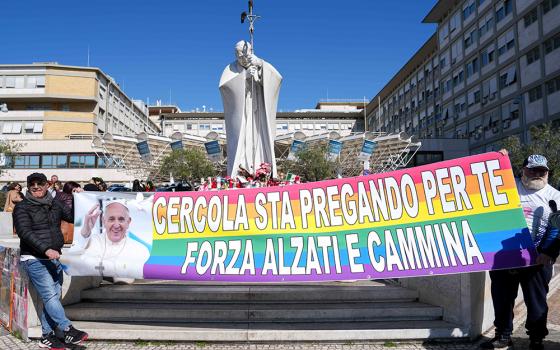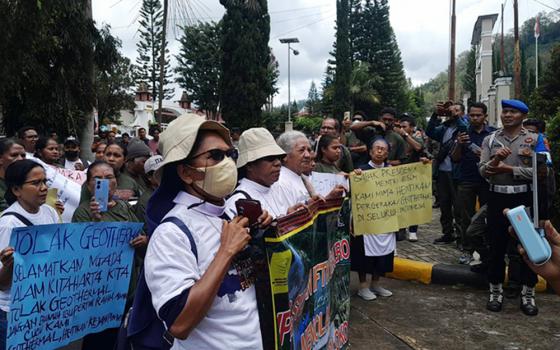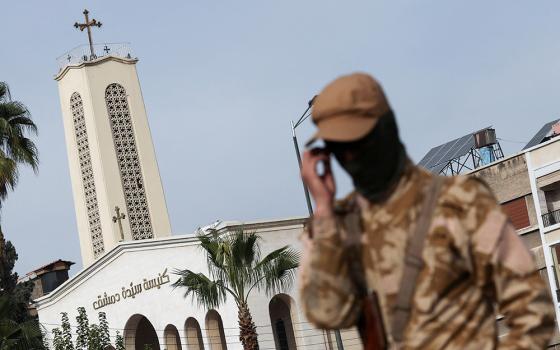

“My sheep hear my voice; I know them, and they follow me” (John 10:27).
Fourth Sunday of Easter
Acts 13:14, 43-52; Ps 100; Rev 7:9, 14b-17; Jn 10:27-30
If you have ever seen a large flock of birds turn and swirl in perfect synchronized motion, you have witnessed one of nature’s wonders. Each individual bird is attuned to some central organized principle that is instantaneously communicated, wingtip to wingtip, to the whole group.
A similar phenomenon is exhibited by a large flock of sheep that can turn and wheel with a precision Busby Berkeley would have given anything to achieve in his dance extravaganzas. As Pope Francis has noted, an experienced shepherd walks within the flock, not ahead of it, thus ensuring that he or she will smell like the sheep while providing the guiding center of their movement and their sense of security.
At the Last Supper, Jesus foretold that sheep without a shepherd will scatter (Matt 26:31/ Zech 13:7), and after the resurrection his first task was to gather the disciples together and to calm them with Shalom, his abiding gift of peace. Our readings for the Fourth Sunday of Easter invoke the theme of the Good Shepherd who lays down his life for his sheep.
The Risen Jesus is with his church as a shepherd. He knows his sheep intimately and they know him. He calls them in and out of the enclosure to green pastures, and they recognize his voice over all other voices. Discipleship begins with this mutual recognition and enduring fidelity. No one can take us out of Jesus’ care, for God, the guarantor of all reality, has entrusted us to him.
In the Book of Revelations, the shepherd is also the Lamb, whose sacrificial death is our passage out of slavery into freedom. We share in his sacrifice and are purified by the blood of the Lamb, the sign of our intimate union with him.
In Acts, Paul and Barnabas negotiate the dangers of preaching Jesus as the fulfillment of the Messianic promise made to Israel. The expanding flock of believers they are gathering for Christ reflects the painful transition and mixing of Jewish and pagan converts, and their proselytizing is disrupting the synagogue communities along the way. Their expulsion signals that creating one fold under one shepherd will be as much a dream as a destination for the church down through the ages.
As conscious human beings, we are not called to be either birds or sheep, but willing participants in the mystery of Christ. The beauty of our unity with one another is also a conscious and deliberate challenge, for Jesus has made it the sign that will reveal his union with God and the Spirit as the Source of all things.
Those who seek to divide the world, its nations, religions and cultures are an affront to Creation itself, which brought order out of chaos. Their diabolical work (Greek for “scattering”) must be opposed with grace and determination. This is the real ministry of evangelization, and every disciple is called to heal and reconcile where others have wounded and divided. Because the hand of God holds us, we are God’s loving and healing hand extended into the world.
This fourth Sunday after Easter coincides with Mother’s Day, celebrated amid the furor over the release of a draft of the possible rejection of Roe v. Wade by the Supreme Court. It also coincides with a crucial weekend in the war in Ukraine, which has focused on women and children as refugees from the violence. Both news stories will add to the political tensions surrounding the issues of abortion and the war.
Jesus, the Good Shepherd, promises abundant life in a peaceful and just world. Working toward such a world will address both difficult questions in ways that will touch every one of us today.
Advertisement






